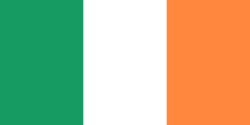 | |
| Nickname(s) | The Warriors (Men) The Banshees (Women) |
|---|---|
| Governing body | Australian Rules Football League of Ireland |
| Rankings | |
| Current | |
| First international | |
| (2001) [2] | |
| International Cup | |
| Appearances | 6 (first in 2002) |
| Best result | |

The Irish national Australian rules football team represent Ireland in Australian rules football and is selected from the best Irish born and raised players primarily from the clubs of the Australian Rules Football League of Ireland but also playing abroad.
Contents
- Identity
- History
- Test results
- Men's International honours
- Women's International honours
- Irish players selected for All-International Team
- See also
- References
- External links
The men's team formed in 2001, going through the Atlantic Alliance Cup undefeated in 2001 to become European champions before also taking the 2002 AFL International Cup where it has made the finals ever since including a 2011 championship. In the early 2010s it was a European powerhouse, winning back-to-back AFL Europe championships in 2010 and 2013 and Euro Cup championships in 2011 and 2012. In 2022 it won the AFL Europe championship and 2023, the EU Cup. It has formed intense international rivalries with Papua New Guinea and New Zealand and European rivalries with Great Britain and Denmark and remains in the top five nations in the sport.
The women's team formed in 2011 for its International Cup debut and is equally successful, being crowned European champions in 2019 and 2022 (the most of any women's side) in addition to a record 6 Euro Cup championships. It has made the final in every International Cup with 2 International Cup forming a strong rivalry with Canada. [3] [4]
Ireland's form has been largely unpredictable due to the availability of experienced players in the playing pool from Gaelic games, particularly Gaelic football (due to its strong similarities). Ireland's Gaelic Athletic Association and the Australian Football League have a very longstanding relationship and have played international rules/Compromise Rules matches between All-Star national representative teams representing each nation's elite sport regularly. Ireland's Australian Rules team tends not to be drawn from that pool, but from club-level gaelic footballers experimenting with a new but familiar sport. That familiarity explains Ireland's consistently high level of achievement at international level.

